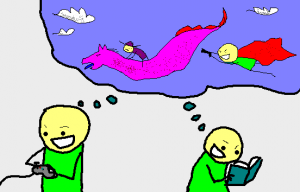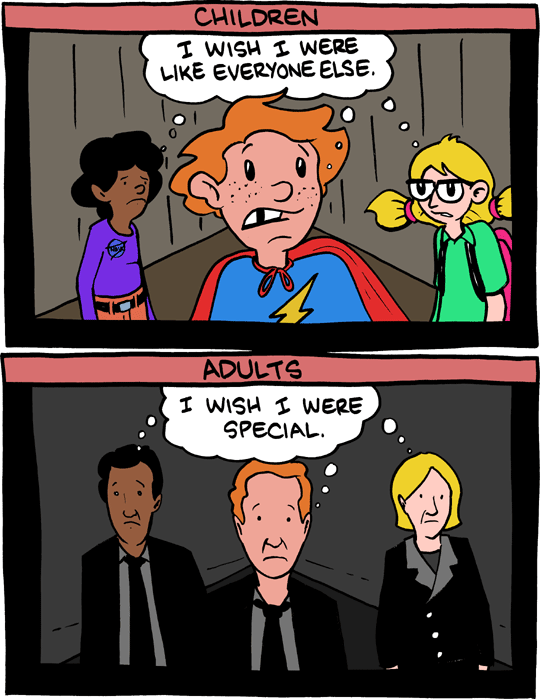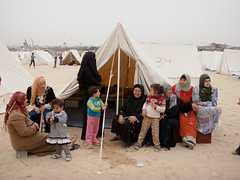Family puts kids in charge for a month
A German author and his wife put themselves to the biggest test of their lives last year by handing over the family power to their two children for a month. The biggest challenge? Managing the budget.
[…]
“For one month we parents unquestioningly took orders from our children. We gave them absolute control of the family budget.”
The result was a long humiliation – asking for pocket money, begging to stay up longer in the evenings, and accepting a “No” without question.
“Even if they grow up with loving, generous parents, children have to do whatever they’re told, day in, day out,” wrote Metzger, explaining the experiment.
“Of course, we’re the big ones, they’re the little ones. It’s our job to protect and feed them, and to show them how things work. But very often we do all that with words and with an attitude that contradicts all the rules of respectful co-habiting.”
Metzger claims the psychological experiment did not come out of any radical pedagogical beliefs – “Me and Helga are not hippies” – but out of a spontaneous decision to allow his son Jonny to train him in table-tennis.
“Afterwards, he gave me a big hug and told me, ‘Dad, no adult has ever talked to me as politely as you did then. That felt really good.’ ”
[…]
(Read the full piece on The Local)
I’m glad to see adults outside alternative education taking note of how condescending and authoritarian adults’ treatment of children is. It does, however, chalk up the children’s inferior planning skills to their age, which isn’t really fair (besides being ageism.)
I bet these kids would be much better at planning if they were allowed to plan more. Since their parents “aren’t hippies” – which apparently means they go to traditional schools – they’ve spent the better part of the day every day for years in an environment in which a clock tells them what to do when. How on earth are they supposed to learn how to plan anything?
Not to mention budget management. In a Sudbury school, the Metzger children would have had the right to participate in school budget decisions – which are boring, so they probably wouldn’t, but if they did they’d know more about budgets – and they would be able to consult with friends amongst the students and staff who have more experience with money.
I guess the thing that disturbs me most about this is that even when a couple is willing to give their children serious responsibility, they do it in this temporary, schizophrenic way. Children actually can deal with real responsibility and control over their life, but that doesn’t mean the children should swap roles with the parents. There’s quite a lot of room for treating each other equally and respectfully within a parent-children relationship, without either side going all authoritarian on the other.


It’s often been said that the moral outrage around video games is the result of a generational gap: most people born before, say, 1970, are unfamiliar with video games, and as a result, they’re afraid of them. This speaks to the negative impressions involved in the debate, and seems to make sense. But the fact that so many people fail to see the immense value, the huge potential for good, in video games, is another matter. I think this part is due to widespread confusion between medium and content.
Video games are a very special medium. Unlike traditional one-to-many media, its content is interactive – the player takes an active part in the events portrayed. Unlike newer many-to-many media (like blogs and social networks), on the other hand, the content of games is not entirely up to the participants to create – a portion of the content is always designed and produced on a one-to-many basis.
But in a way, video games are still just a medium. Like with other media, the medium does not necessarily define the content, nor does the content necessarily define the medium.1 If you’re thinking about a more familiar medium, such as books, it would be obviously absurd to judge what the medium (all books, or any book) can do based on some small part of the content (a given genre or literary style). Depending on what books you’re familiar with, you might come to the conclusion that books are low-quality, stupefying entertainment, or that books are intensely deep and philosophical. Neither of these things is true of books as a whole, and each is true of some books. But oddly enough, most people think of books as a medium with potential to enlighten, educate, and enrich people’s lives immensely.
There’s no factual reason not to feel the same way about video games. Okay, video games are a young medium, and they’ve come into being in a very commercialized environment, so not all game designers or all players think of the medium as an art form that aims to enlighten. But neither do all authors and readers, nor all movie producers and filmgoers.
To recognize the potential for good in the medium, you simply have to realize that it really is a medium. If a child “plays a lot of video games” that could mean almost anything, but many people take it as something to be alarmed about. If a child “reads a lot of books” that could also mean almost anything – there are plenty of really awful books out there – but most people assume it means the kid is discovering intellectual worlds and learning a lot.
The way games can be good, conductive to intellectual discovery, are not all that different from books. Yes, some games are trash, but because a medium is a vessel of culture, a creation which is filled, by a creator, with stories and concepts taken out of the broader culture (directly or indirectly), they can, just like books, be a gateway to greater things. I have often learned new things about the world through a game, or come into contact with concepts and stories I later took more interest in and learned more about. This doesn’t happen with every game, but that’s entirely beside the point.
It would be the wrong conclusion from all this to think, for example, that parents should monitor their children’s gaming and make sure they choose games with good cultural content. That’s not how media work.
For example, just yesterday I finished an action game, Assassin’s Creed. I tried it out because I heard it’s good-looking, fun, and allows you to do cool things. These cool things include killing a lot of virtual characters in interesting ways. As a bonus, part of the game takes place in my hometown, ca. 1291 CE.
As it turned out, the game was much more intellectually stimulating than I expected, due to the historical setting more than the somewhat philosophical story. It got especially interesting when I reached the part of the book I was reading, The Source (which I wrote about, too), that tells another fictional story in the same part of the world at that very same time. And the end of the game led me to Wikipedia a few stories (historical and pseudo-historical) the game referred to.
Like any medium, video games can provide deep food for thought and leads for curious inquiry even when you don’t expect it. Like any medium, the intellectual value is not necessarily – but sometimes – the reason to consume a new opus. Like any medium, painting video games as mind-dulling or violent, even based on a good sample of evidence, is throwing out the baby with the bath water.
And of course, from a psychological perspective, there are those many benefits of video gaming, as well.
Keeping this in mind, a parting thought: isn’t it strange that there’s a rating industry in charge of telling us what age you should be before consuming a movie or a game – an industry so well-supported that some countries legally enforce their conclusions – but nobody does the same for books and newspapers?

Footnotes
- It’s also true that “the medium is the message“, but this is another matter: the medium influences how the content is perceived, but it is not the same thing as the content.
 ]]>
]]>]]>It is sad to see, in our age-graded society, that many if not most children and adolescents have few opportunities to get to know and to interact regularly with children who are much younger than themselves. If we want young people to grow up to be compassionate and caring, we need to allow them to exercise those capacities; and to do that we need to break down the barriers we have erected to keep young people of different ages apart. We are designed by nature to learn to be compassionate by observing and caring for littler ones while we ourselves are growing up.

I must have gotten this link over Facebook or Twitter, but I can’t recall to whom credit is due. At any rate, I found it interesting, especially because it looks at an aspect of the conflict that is not often discussed but might be one of the most critical in the long run: the experience of Palestinian children.
I grew up aware of the conflict in a very different way from my contemporaries on the Palestinian side. The Mondoweiss post discusses, with many excerpts, a new report criticizing aid organizations’ failure to prevent injustice towards children and to protest Israel’s violations of international law regarding children and their well-being.
Israel routinely treats children as enemies. I think Israel should actually make it part of its security policy to make sure Palestinian children are treated well and protected, because they will grow up to be Palestinians adults who we have a strong interest in not being intensely despised by. I happen to believe that Israel has done genuine grievance to the Palestinians and much of their hate (which is often of the non-compromising raging racist variety) is due to legitimate gripes with what our government (and some of its citizens) have done in the past 63 years. But it seems many in Israel think the Palestinians just hate us for no good reason, and cannot be appeased. Either way, we should be doing our best to show them that we are human and humane, like we keep telling ourselves and the rest of the world. Instead we make their lives a living hell and increasingly allow ourselves to only be represented towards them by our army.
Even if we think that Eden Abergil and her ilk are a marginal phenomenon (Google her if you missed the controversy)– and it can’t be entirely marginal, as Breaking the Silence and others subsequently released more pictures of soldier’s celebrating prisoners and dead opponents — we have an interest in doing our best to minimize animosity towards us. And I find it very difficult to accept that my government is systematically splitting up families, arresting children, interrogating them until they confess, and making it practically impossible for them to lead a normal, healthy childhood. I won’t even mention the number of children Israel apparently killed in “Operation Cast Lead”. Many in Israel may blame the Palestinians’ leaders for it coming to this, but that’s besides the point, as those children will certainly grow up to blame Israel, and that should be prevented, even at great cost and effort.
Like most Israelis, I grew up hearing about the horrors experienced by children in the Holocaust. I can’t help but feel the same despair when I think about how every day, Palestinian children experience things that remind one, even if just a little, of what my paternal grandmother and her contemporaries in Europe went through. And this feeling of despair is compounded by the fact that the perpetrators, this time, are supposed to be representing me and my family — and the families of so many whose childhoods were obliterated by monstrous state violence not so long ago.
The place of children in this conflict is one of the most horrifying aspects of it — on both sides, but especially in those areas where children regularly experience violence and great injustice (which is mostly where the civilians are Palestinians). Peace, and, even more, normalization, will not be possible with generations who have a ruined childhood to hate us for. It’s the kind of thing a person can hardly ever get over, even if they try. I hope Israel’s governments will soon realize this and stop making it impossible to ever end this conflict.
]]>